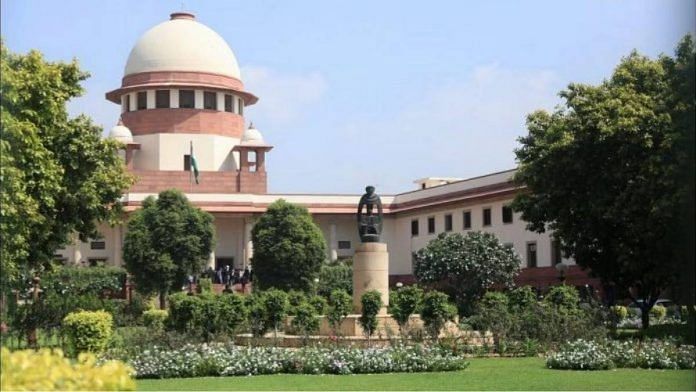New Delhi: While striking down the Narendra Modi government’s electoral bond scheme Thursday, the Supreme Court suggested the use of electoral trusts as an “effective alternative” for political donations.
While hearing petitions challenging the Finance Act, 2017, the legislation through which Modi’s National Democratic Alliance (NDA) dispensation introduced electoral bonds, the court dismissed the central government’s argument that the scheme was meant to curb black money. The scheme, the court said, did not satisfy the proportionality test of being the least restrictive measure to achieve its aim.
“Proportionality” is a test used by Indian courts to test whether any state action that interferes with the exercise of a fundamental right is proportionate to the goal it seeks to achieve. One of the factors considered for this test is whether it is the “least restrictive measure” for achieving the goal.
Instead, the court suggested electoral trusts, a mechanism for political donations introduced by the Congress-led United Progressive Alliance — Modi government’s predecessor.
“Even if the argument that the Electoral Bond Scheme fulfills the purpose is accepted, non-disclosure of information on political funding is not the least restrictive means to achieve the purpose,” the court said in its ruling.
Here’s a lowdown on what electoral trusts are and how they work in comparison to electoral bonds.
Also Read: 10 important observations SC made while striking down electoral bonds scheme as unconstitutional
Electoral trusts — what are they and who can donate
In 2013, the UPA government allowed the setting up of electoral trusts under Section 25 of the Companies Act, 1956, with the sole purpose of allowing companies and individuals to fund political parties.
Defined under Section 2(22AAA) of the Income Tax Act, 1961, an electoral trust is a “trust so approved by the Board in accordance with the scheme made in this regard by the Central Government”.
According to the UPA government’s Electoral Trusts Scheme, 2013, only companies registered under Section 25 of the Companies Act, 1956, were eligible to set up electoral trusts. The scheme allowed firms to not only pool money but also contribute to multiple political parties.
According to the law, electoral trusts can receive non-cash contributions from Indian citizens, Indian companies, firms, HUF (Hindu Undivided Family), or any other body residing in India. However, non-citizens, those without PAN cards, and Non-Resident Indians without a passport number cannot make contributions.
Once it receives a contribution in the form of a cheque, drafts, or bank transfers, an electoral trust is required to issue a receipt with basic identity details — including the name and PAN card number of the contributor, and the amount contributed.
‘Maintains anonymity, eliminates black money’
The key difference between an electoral bond and electoral trust is the degree of transparency they afford. While the electoral bond scheme focuses on donor anonymity, requiring the State Bank of India (SBI) — the sole issuer of the bonds — as well as recipient political parties to keep this information confidential, electoral trusts are mandated by law to maintain a list of contributions and submit them to the Election Commission of India.
Rules also require that such records must be submitted to the income tax commissioner along with an audit report.
It was precisely this difference that the Constitution Bench of the Supreme Court highlighted in its ruling Thursday. The framework of electoral trusts helps maintain donor confidentiality while still being transparent about the funds received, the court said.
Electoral trusts, according to the court, will have fewer “political consequences” for contributors, the court said. This is because where donors are contributing to multiple parties, only the list of donors and political parties is disclosed, thus making it difficult to determine to whom individual donors have contributed.
“In this manner, the purpose of curbing black money in electoral financing will be met. At the same time, there would be no fear of consequences from political opponents because the information as to which political party donations were made to is not disclosed,” the court said.
In addition, all trusts are required to submit an annual report with a list of donations to the Election Commission, the court said.
“From the report, it cannot be discerned if contributor ‘A’ contributed to a particular political party. It can only be concluded that contributor ‘A’ could have contributed to (a) party,” the court noted.
It said that it’s only in cases where a donor is contributing to a single political party that the nexus between them could be made out. This, however, is the explicit choice of the donor, the SC added.
(Edited by Uttara Ramaswamy)
Also Read: ‘Throwing baby out with bathwater’ — BJP reacts to SC declaring electoral bonds unconstitutional



